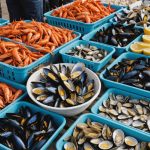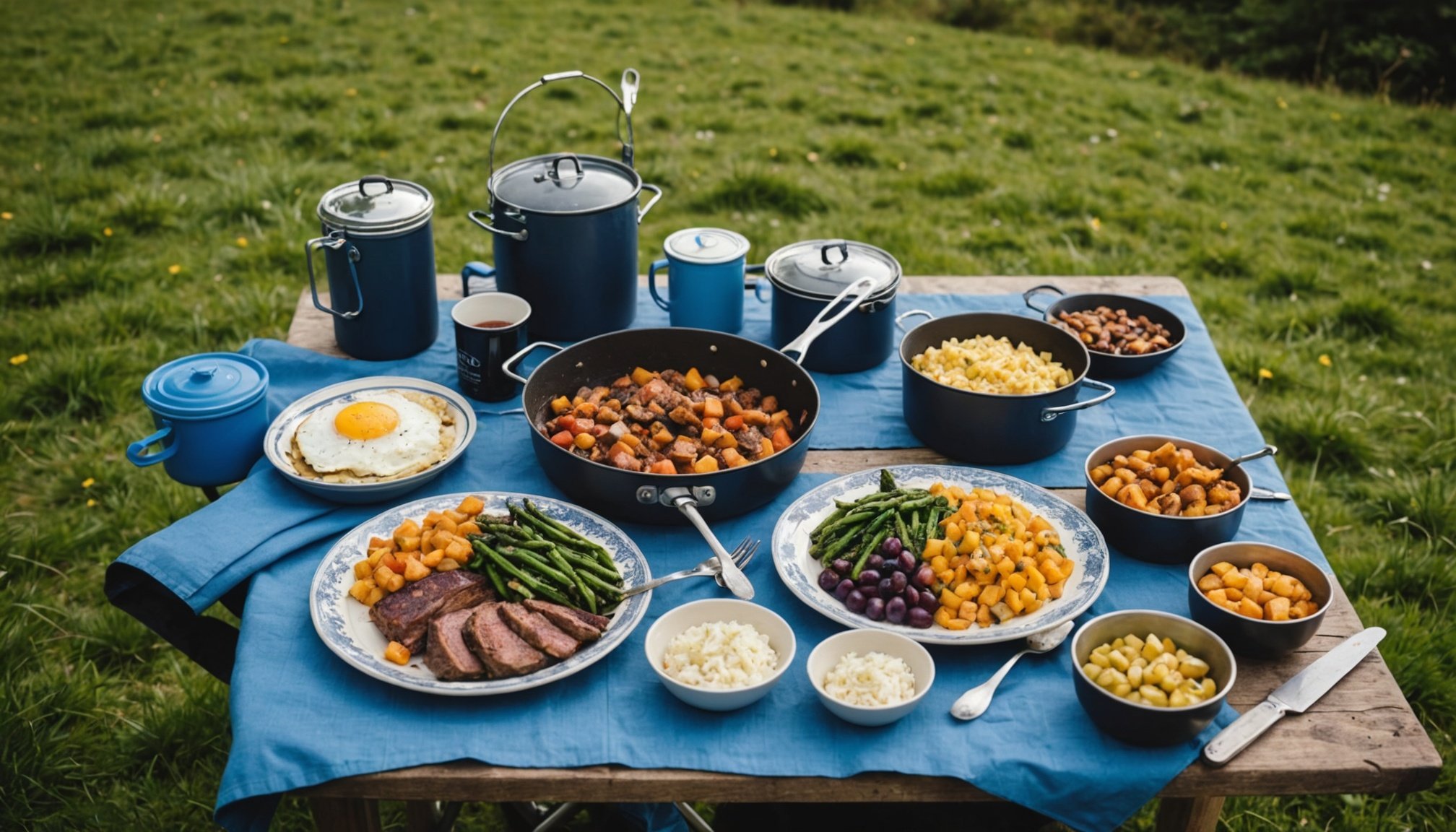Comprehensive Meal Planning Strategy
Crafting an effective meal planning strategy is essential for a successful camping trip. In the UK, where weather conditions can change quickly, it’s vital to prepare nutritious and varied camping meals. A balanced meal plan should encompass different meal types: breakfast, lunch, dinner, and snacks, while maintaining a focus on nutrition and variety.
Breakfast, for instance, could include both quick options, like porridge, and more elaborate meals, such as full English breakfast, depending on time and resources available. For lunch, sandwiches made with locally sourced ingredients provide convenience without sacrificing health, ensuring delightful countryside picnics. Dinner options could vary from simple one-pot pastas to grilled vegetables, catering to diverse needs and using the vibrant produce of the UK.
This might interest you : Uncover the top uk campsites for unforgettable equestrian escapades: the definitive guide to booking horse riding adventures!
To balance convenience and health effectively, emphasize meals that require minimal preparation yet offer substantial nutritional value. This can be achieved by incorporating fresh fruits, vegetables, protein-packed snacks, and whole grains into your meal plan. Planning ahead ensures each meal has variety and caters to dietary preferences, which enhances the outdoor experience. Thus, thoughtful meal planning becomes a fulfilling part of the camping adventure itself.
Recipe Ideas for Each Meal
When planning camping meals, having creative and easy-to-make options is essential to using minimal equipment for UK food preparation.
In the same genre : The complete handbook for enjoying a safe and eco-friendly campfire adventure in the uk
Breakfast Options
Start the day with nourishing camping recipes. Think beyond cereal with a breakfast burrito wrap filled with scrambled eggs, veggies, and cheese. For a gluten-free twist, try oatmeal bowls topped with fresh fruit and nuts. Both are simple and fuel-packed, perfect for outdoor cooking.
Lunch Ideas
Lunch should be stress-free, so consider hearty wraps or sandwiches. Use a base of whole grain bread or a tortilla, filled with savoury proteins like smoked salmon or grilled chicken. For vegetarian alternatives, hummus paired with roasted peppers can be delightful. Prep ingredients beforehand and store them in airtight containers for quick assembly.
Dinner Selections
End the day with a one-pot wonder. A rich lentil stew or a cheesy pasta pot delivers warmth and satisfaction. Incorporate abundant local vegetables such as carrots and spinach, ensuring a nutritious feast. Easy-to-prepare meals help keep your time near the campfire joyful, leaving more moments for unwinding and enjoying nature.
Meal Prep and Packing Techniques
Efficient meal prep and packaging are vital for a smooth camping experience. Start by organising your meals into categories such as breakfast, lunch, and dinner. Pre-chop vegetables and marinate proteins at home to save time and fuel during the trip. When preparing meals, aim for recipes that use similar ingredients to simplify camping packing. This reduces bulk and minimises waste.
Proper food storage is crucial to maintain freshness and prevent spoilage. Food storage tools like resealable bags and airtight containers are excellent for keeping ingredients separated and fresh. Invest in a high-quality cooler that offers ample space and sustained temperature for perishable items. Employ cooling packs for extra assurance.
To optimise space, consider using collapsible containers which are lightweight and compact, ideal for the outdoors. Each container should be clearly labelled to help you easily access needed items. Keep heavier cooling equipment at the bottom to prevent crushing delicate foods. For added convenience, bring minimal but multipurpose cooking tools to enhance your UK food preparation setup.
These techniques not only streamline meal preparation but also make your camping trip more enjoyable and hassle-free.
Shopping List Essentials
Creating a camping grocery list ensures you have all necessary meal ingredients for a successful trip. Prioritize sourcing fresh, local ingredients available in the UK to support sustainability and enjoy superior flavours. Food shopping done right enhances the quality of your camping meals, adding a delightful touch to the overall experience.
A comprehensive list should include:
- Proteins: Choose versatile options like smoked salmon, eggs, or lentils, suitable for various meals.
- Veggies and Fruits: Opt for robust produce such as carrots, spinach, apples, and berries that stay fresh longer.
- Staples: Pack essentials like olive oil, spices, and whole grains (e.g., rice, oats) for flexibility in meal preparation.
- Snacks: Plan for nutritious options like nuts, dried fruits, and protein bars to keep energy levels high.
Focus on items that balance convenience and nourishment. The freshness and shelf-life of perishable foods are crucial, so consider using vacuum-sealed packages to lock in nutrients and extend expiry. Always adjust the list according to the specific dietary needs of your group, ensuring everyone can enjoy their meals without concerns. This careful preparation leads to stress-free and enjoyable outdoor cooking.
Dietary Considerations for Campers
Navigating dietary restrictions during camping can be challenging but essential for a nutritious experience. Addressing various dietary needs, such as vegetarian, vegan, and gluten-free requirements, ensures enjoyment for all parties. How can campers effectively manage food allergies? Careful planning: identify allergen-free meals and pack alternatives to common allergens like nuts or dairy.
Achieving balanced camping nutrition involves thoughtful inclusion of diverse ingredients. Focus on incorporating plenty of fresh produce, healthy fats, and proteins to maintain energy and well-being. What if someone is a vegetarian or gluten-intolerant? Adapt traditional camping meals like burgers and wraps with plant-based patties or gluten-free tortillas.
Managing food allergies? Prepare meal options that emphasise naturally allergen-free ingredients and avoid cross-contamination by separating equipment during meal prep. Explore versatile foods, such as lentils or quinoa, which cater to multiple dietary requirements.
Maintaining a balanced diet whilst camping is vital.; however, this can be simplified through thorough meal planning. Adaptability and creativity with ingredients ensure delicious meals that accommodate all campers. Taking these steps ensures everyone can indulge in the great outdoors without dietary concerns, fostering a seamless camping trip experience.
Food Storage Solutions while Camping
Effective food storage is crucial for a smooth camping experience, ensuring meals remain fresh and appetizing in the outdoor setting. To achieve this, it’s essential to use reliable food storage techniques that align with outdoor camping refrigeration needs.
Invest in high-quality coolers that maintain a consistent temperature. They are indispensable for keeping perishable items safe. Coolers with effective insulation extend the life of your supplies. Pair them with reusable ice packs to enhance cooling efficiency.
Utilize storage containers that are airtight and made of durable material. Both help protect food from spoilage and contamination. Clear containers are useful for quick access and easy organization. While collapsible containers optimize space, they don’t compromise on protection and storage.
Consider outdoor preservation tactics like vacuum-sealing to prolong the shelf-life of your foods. This method locks in nutrients and keeps perishables fresh for a longer duration.
Lastly, practice strategies to reduce food waste. Plan precise meal portions and use leftovers creatively in another recipe. These smart storage solutions and waste-reduction practices help in delivering a hassle-free, enjoyable camping trip.
Visual Aids and Tools
Maximizing efficiency in meal planning for camping is greatly enhanced by incorporating visual aids. Utilizing meal planning charts ensures a structured approach, enabling campers to plan, organize, and manage their meals effortlessly. Charts can help map out daily meals, ensuring no essential item is forgotten.
Checklists play a crucial role in camping meal preparation. By creating detailed lists, campers can easily track packing and meal prep tasks, ensuring each meal idea is well executed. Such checklists include sections for groceries, meal ingredients, and cooking equipment, offering a stress-free shopping and packing experience.
When it comes to UK food preparation, equipping yourself with the right cooking tools is vital. Versatile gadgets like portable stoves and multitools enhance the cooking experience. These tools should be lightweight and efficient, making outdoor camping meals simpler to prepare.
Incorporating these visual aids and tools not only streamlines the meal preparation process but also enhances the overall camping experience. Simplifying meal planning reduces anxiety and adds a layer of enjoyment to outdoor adventures, ensuring memorable meals in nature’s embrace.








